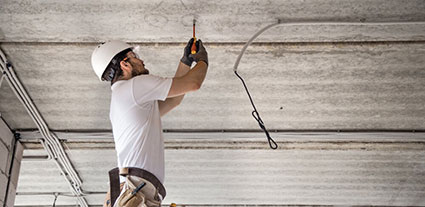No matter what kind of business you have, chances are you’ve already needed a commercial electrician. With our many years of expertise, there is a huge range of electrical jobs we’ve helped our customers with, but there are a few that are so common that we thought we’d let you know what they are. Perhaps you might spot an issue in this list you didn’t know you had!
(1) Universal wiring problems
Although businesses are different from homes in many ways, they share the need for safe wiring. Especially if you’ve recently purchased a new business, or you’re remodelling an existing workspace, you might stumble across evidence of subpar electrical conditions. These can include:
- Exposed wiring, or wiring in poor condition.
- Visible or audible sparks in a switch or connection.
- Repeated ‘faulting out’ or setting off safety switches or tripping breakers.
These are serious problems that should no more be ignored at a place of business than you would ignore them in your own home. While often simple to fix, these are signs that someone could get seriously hurt in your workplace.
(2) Inadequate and outdated switchboards
Most people have a basic understanding of what a switchboard does: it’s like the control and distribution centre for electricity in your workplace. The mains power comes into the building via the switchboard, and from there the power is directed to various circuits in the business via breakers. Sometimes you can tell right away that your switchboard isn’t up to scratch. If you’re dealing with a switchboard that dates before the 1990s, you have old bakelite or ceramic fuses or plug-in circuit breakers, or perhaps your meter looks like it wouldn’t be out of place in a BBC period drama. The other reason you might need an upgrade is if you’re adding new, significant load to your workplace’s electrical needs, then it’s likely your switchboard will need an upgrade. Examples of a new, significant load are:
- Air-conditioning and refrigeration.
- Water heating.
- Commercial washers and dryers.
- Computer servers.
- Audiovisual projectors.
One way to determine if a new addition to your workplace is likely to draw significant current is to look at it’s maximum wattage. This gives you an indication of how much power it will draw, and how likely it is to require its own circuit to satisfy it. For example, even a split system air conditioner may use 500 watts or more on a heating setting, but an electric oven can be up to 5,000 watts! The safest option is to consult an electrician, who will be able to assess your existing switchboard for suitability and let you know if it’s a legal or safety requirement to have your new addition on a separate circuit.
(3) Fault-finding
We’re often called out to discover the culprit of frequent breaker-tripping. If your business is struggling to manage day-to-day power needs because you’re constantly having to turn appliances off, or reset breakers, then this can be a sign that there’s a hidden wiring fault. Sometimes it’s as simple as an overload on one circuit, with too many appliances attempting to draw power at the same time and the circuit can’t handle it. But sometimes it’s more sinister, such as a short circuit. Short circuits occur when there are dangerous exposed wires within a circuit that are accidentally contacting neutral wires and causing a large amount of electricity to flow through the circuit. This generates a lot of heat and can even start a fire. These faults are sometimes accompanied by an unpleasant burning smell or discolouration of the breaker that makes it look singed. Another type of faulty wiring is ground fault surges. These occur when the bare live wire touches a ground wire or the metal case of an outlet box instead of a neutral wire. This again causes too much electricity to flow through the circuit, and the breaker will trip to prevent a fire. These kinds of faults can cause burning smells and discolouration around the outlet rather than the breaker. Electricians are qualified to identify the type and location of faulty wiring, protecting you and your employees from the significant risks that come with these faults. The bottom line is, if your breakers are constantly tripping, and especially if this is accompanied by a smell of burning or discolouration anywhere, do not try to handle it on your own. This can result in serious injury or even death. Call an electrician promptly for a rapid assessment of your problem.
Let us help keep your workplace safe
If this list rings any bells with you, pick up the phone today and contact Smillie Electrical. Our courteous staff will help you book a prompt assessment of the issue, and provide a fast, free quote to get you doing business again as safely as possible. We guarantee all our work and are available 24/7. Whatever your business, whatever your problem, Smillie Electrical can help!



